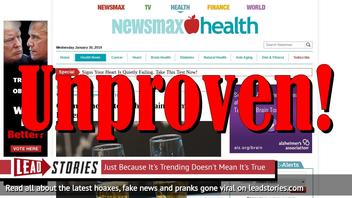
Does Champagne protect the brain from dementia? No, contrary to what a viral article says there is no proof for this claim yet. The story is based on a misinterpretation of the results of a 2013 study of the effect of Champagne on the spatial working memory of rats which has been used as the basis of several pseudo-scientific articles to promote Champagne consumption as a way to fight memory loss.
The story reappeared in an article published on January 29, 2013 by Newsmax on titled "Champagne Protects the Brain From Dementia" (archived here) which opened:
Here's a good reason to make a toast: Researchers have found that a compound in grapes used to make champagne can improve spatial memory.
"The results were dramatic," says Jeremy Spencer, a professor at the University of Reading in England and one of the investigators on the study's research team.
"The compounds were found to favorably alter a number of proteins linked to the effective storage of memories in the brain."
The researchers found that drinking three glasses of champagne weekly can protect the brain from dementia and prevent memory loss by restoring crucial proteins.
Users on social media only saw this title, description and thumbnail, leading them to think the claim had been scientifically proven:
Champagne Protects the Brain From Dementia
Here's a good reason to make a toast: Researchers have found that a compound in grapes used to make champagne can improve spatial memory. "The results were dramatic," says Jeremy Spencer, a professor at the University of Reading in England and one of the investigators on the study's research team.
But the actual study was performed only on rats so it is scientifically impossible to draw definite conclusions about the effect on humans without actually testing them too:
Phenolic Acid Intake, Delivered Via Moderate Champagne Wine Consumption, Improves Spatial Working Memory Via the Modulation of Hippocampal and Cortical Protein Expression/Activation | Antioxidants & Redox Signaling
Aims: While much data exist for the effects of flavonoid-rich foods on spatial memory in rodents, there are no such data for foods/beverages predominantly containing hydroxycinnamates and phenolic acids. To address this, we investigated the effects of moderate Champagne wine intake, which is rich in these components, on spatial memory and related mechanisms relative to the alcohol- and energy-matched controls.
The study didn't even test if drinking three (or four, or any) glasses of Champagne had any effect on dementia in humans so the headline on the Newsmax article is not based on any study result or evidence. It is just repeating a claim made by other articles that made the same mistake.
This was already noted by Science Alert in 2015:
Can Champagne Really Improve Your Memory And Stave Off Dementia?
If you've seen one of those viral headlines claiming that three glasses of champagne a day will stave off dementia, forget them right now. This false claim recently originated from an erroneous headline somewhere in UK tabloid-land, and unfortunately, lots of online publications just ran with it.
But this hasn't stopped several other viral articles from popping up with the same claim about bubbly since. Perhaps the authors of these new articles forgot to check Google? Maybe they just drank too much Champagne, who knows...















